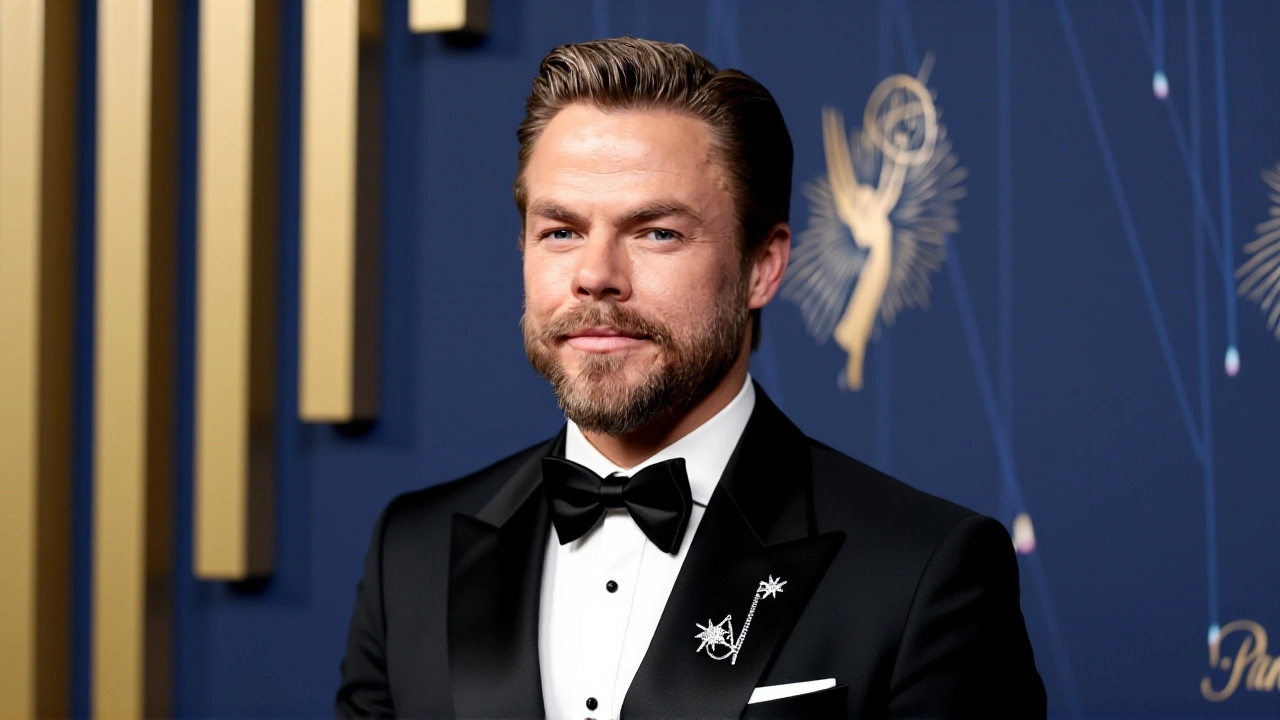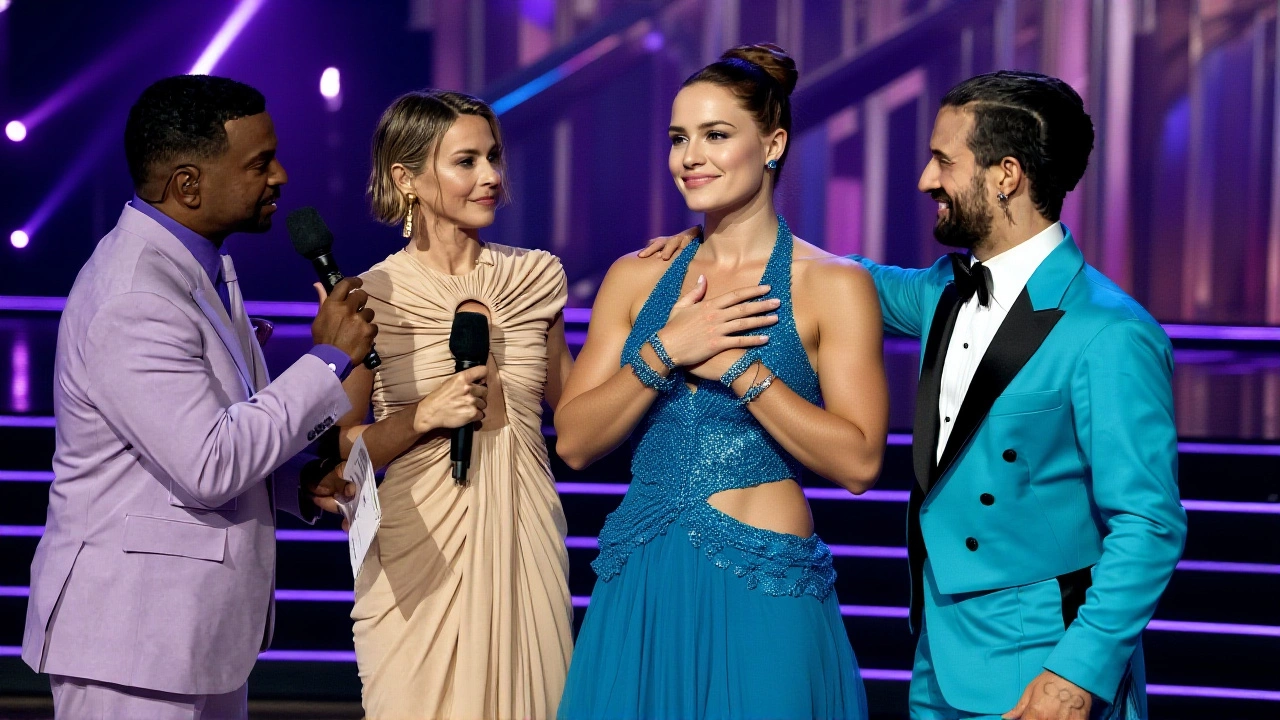When Whitney Leavitt and Mark Ballas were eliminated from Dancing with the Stars during the semifinals on Monday, November 18, 2025, most viewers expected tears. Instead, they got gratitude — raw, unfiltered, and unexpectedly powerful.
Just hours after their exit, the pair sat down with Extra TV for a 2-minute, 29-second interview that quickly went viral. Leavitt, a celebrity contestant with no prior dance background, didn’t dwell on the loss. "I think it’s just being grateful," she said, her voice steady. "Like I just… I’m just so grateful." The moment wasn’t performative. It was real. And it landed harder than any triple axel could.
The Last Hurdle
Leavitt and Ballas finished fifth in Dancing with the Stars Season 33 — the show’s 21st anniversary season — after being cut when only four couples remained. For Ballas, a three-time champion (Seasons 6, 9, and 12) who returned to the show in 2023 after a 13-year hiatus, the timing stung. "Look, it sucks to fall at the last hurdle," he admitted. But then he paused, smiled, and added: "But I’ve been super proud of the work."
What made their run different wasn’t just the scores — though their salsa and freestyle routines earned near-perfect marks. It was the quiet transformation unfolding behind the scenes. Ballas, who first joined Dancing with the Stars at age 21 in 2007, said he and Leavitt "became close friends" during their journey. "This is just an amazing time," he said. "And things will come from this. There’s things in the pipe that we can’t say yet. It’s coming."
A Season Like No Other
Season 33 marked a major shift for the show. After moving from ABC to Disney+ for Seasons 29–31, it returned to ABC in 2023 — and this year, the producers leaned hard into the show’s early-2000s energy. Ballas called it "really unprecedented," noting the intensity felt like "how it was back in the day." The choreography was sharper. The music louder. The stakes higher. And the audience? More emotionally invested than they’d been in years.
Leavitt, whose background before the show remains largely private, didn’t just survive the pressure — she thrived under it. "Extra" correspondent noted she "didn’t miss a beat" during the elimination moment. "Just hand having so much grace... Oh, at that difficult moment," she laughed, gently correcting the interviewer’s phrasing. That moment — the way she turned disappointment into grace — is what people are talking about now.

What Happens Next?
Ballas hinted at upcoming opportunities for Leavitt — "things in the pipe" he couldn’t disclose yet. Industry insiders believe her visibility on Dancing with the Stars will open doors in acting, public speaking, or even brand partnerships. Her authenticity resonated. So did her humility. She didn’t come to win a mirrorball trophy — she came to grow. And she did.
She also gave a shout-out to "Dena," a figure whose role remains unclear but who clearly played a pivotal part in her journey. Whether a coach, mentor, or emotional anchor, Dena’s presence underscores how deeply personal this experience was for Leavitt.
For Ballas, this season was more than another stint on the show. It was a reminder of why he returned. "I’ve done this for 16 seasons across two stints," he said. "But this one? This one felt different."
The Ripple Effect
Leavitt’s story isn’t just about dance. It’s about what happens when someone steps into the spotlight not to perform, but to become. In a culture obsessed with winning, she chose gratitude. And that’s rarer than any perfect 10.
Her experience has already changed her life — even if she can’t yet explain how. Maybe it’s the confidence she found. Or the friendships forged in sweat and stress. Or the realization that failure doesn’t erase value — it refines it.
Meanwhile, Extra TV, the syndicated entertainment news program that’s been broadcasting from Warner Bros. Studios in Burbank since 1994, captured something beyond ratings: a quiet moment of human resilience.

Behind the Scenes: The Ballas Legacy
Mark Ballas isn’t just a dancer. He’s a legacy. His three wins tied him with Derek Hough for most by a pro. He choreographed for pop stars. He toured with Broadway shows. And yet, he chose to come back to Dancing with the Stars — not for the paycheck, but for the connection.
This season, he wasn’t just teaching steps. He was helping someone find her voice. And in doing so, he reminded viewers why the show still matters.
Frequently Asked Questions
Why did Whitney Leavitt’s elimination stand out compared to others this season?
Unlike many eliminated contestants who expressed frustration or tears, Leavitt responded with quiet gratitude, telling Extra, "I’m just so grateful." Her composure and emotional honesty stood in stark contrast to the drama-heavy tone of recent seasons, making her moment go viral and sparking widespread admiration for her authenticity.
What did Mark Ballas mean by "things in the pipe" for Whitney Leavitt?
While Ballas didn’t specify, industry sources suggest Leavitt is being considered for acting roles, motivational speaking engagements, or brand ambassador positions tied to wellness and resilience. Her DWTS exposure — especially her emotionally grounded public persona — makes her a rare commodity in entertainment, where authenticity sells.
How did Season 33 of Dancing with the Stars differ from previous seasons?
Season 33 returned to ABC after three seasons on Disney+ and embraced the high-intensity, emotionally raw format of the show’s early years. Choreography was more complex, music choices bolder, and eliminations more dramatic. Mark Ballas called it "unprecedented" and "how it was back in the day," signaling a deliberate return to the show’s roots.
Who is Dena, and why did Whitney Leavitt mention her?
Dena’s full identity hasn’t been confirmed, but Leavitt’s shout-out suggests she was a key support figure — possibly a coach, therapist, or close friend who helped her navigate the emotional toll of the competition. In reality TV, such acknowledgments often hint at behind-the-scenes relationships that shaped a contestant’s journey beyond the dance floor.
Has Mark Ballas ever been eliminated this late in the season before?
No. Ballas won three times as a pro (Seasons 6, 9, 12) and never finished outside the top three. His fifth-place finish with Leavitt marks his first time being eliminated in the semifinals — a rare and humbling moment for the most decorated pro in DWTS history.
What impact might this have on future DWTS contestant selections?
Leavitt’s journey — a non-celebrity-level public figure who became a fan favorite through vulnerability — may encourage producers to cast more "real people" rather than just actors or athletes. Her success proves emotional resonance matters more than fame. The show may shift toward contestants who tell meaningful stories, not just those with the biggest social media followings.
